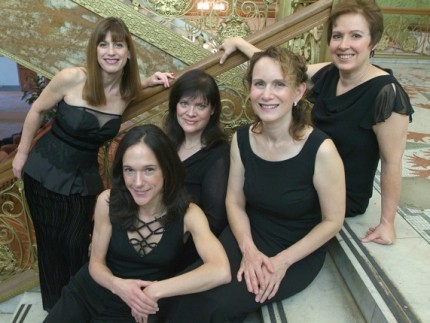Orion Ensemble closes season with jazz-flavored world premiere

Virtually since the birth of jazz in the early 20th century, Darius Milhaud, George Gershwin, Duke Ellington and a host of other composers have tried to merge this most American of musical forms with classical music. Many of these efforts have come off as stiff or forced, but some have produced important if still not fully accepted works like Leonard Bernstein’s Mass and even a few masterpieces, like Gershwin’s Rhapsody in Blue.
The latest composer to take on this challenge is Chicago jazz pianist Miguel de la Cerna, who is best known for his arrangements for singers such as Dee Alexander, Oscar Brown Jr. and Bobby Wilsyn.
The Orion Ensemble presented the world premiere of his resulting creation, Livingston 8 – A Fantasy, Sunday evening in Nichols Concert Hall at the Music Institute of Chicago in Evanston. The 16-minute cross-genre work, scored for piano, violin, cello and clarinet, was commissioned by the five-member, all-female chamber ensemble. The group has made versatility and creative programming like this hallmarks of its 19 years together.
Named for de la Cerna’s childhood telephone prefix, Livingston 8 draws on the jazz, gospel, blues and funk that he heard growing up on Chicago’s South Side as well as the music he has performed and experienced in his own notable career.
But this piece is no mere pastiche. He has created an ambitious, complex work tinged with these personal musical influences but very much possessing its own language solidly rooted in a modern classical style.
While this music is certainly accessible, it never kowtows to the listener. Breezy motifs and appealing, bluesy chords run through this piece, but they are embedded in a tightly interwoven, at times faintly dissonant score. In some ways, this piece is reminiscent of Astor Piazzolla’s small-ensemble works, which fuse tango and classical music but always possess their own evocative, sometimes wistful sound.
But unlike Piazzolla’s superbly constructed gems, the structure of Livingston 8 is more elusive and unwieldy, with little in the way of a forward-thrusting musical narrative. Indeed, at times, the work seems a bit repetitive, and ends in an oddly abrupt way.
Perhaps the biggest criticism is the surprisingly limited role of the piano (skillfully performed by de la Cerna), which provides a firm rhythmic and harmonic foundation but little more. As a solo toward the end — one of the piece’s highlights — makes clear, the instrument needs to be more prominently featured.
Ideally paired with the premiere on the second half was Timofei Dokshitser’s pared-down arrangement of Rhapsody in Blue for clarinet and piano. While it has an obviously thinner sound than the better-known orchestrated versions of this classic, it nonetheless captures the work’s essential spirit. Pianist Diana Schmück and clarinetist Kathryne Pirtle offered a technically sound performance, but this stylistic mélange could have benefited from a looser, jazzier approach.
Opening the program was a rich, multilayered interpretation of Gabriel Fauré’s Piano Quartet in C minor, Op. 15, with Stephen Boe substituting for the Orion’s usual violist, Jennifer Marlas.
The program will be repeated 7:30 p.m. Wednesday at Ganz Hall and 7 p.m. May 13 at Fox Valley Presbyterian Church in Geneva. orionensemble.org; 630-628-9591.
Kyle MacMillan is the former classical music critic of the Denver Post. He is a regular contributor to Opera News and has also written for such publications as Symphony and Chamber Music magazines.
Posted in Uncategorized




